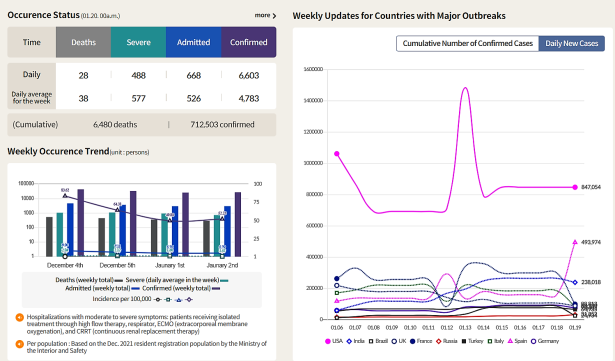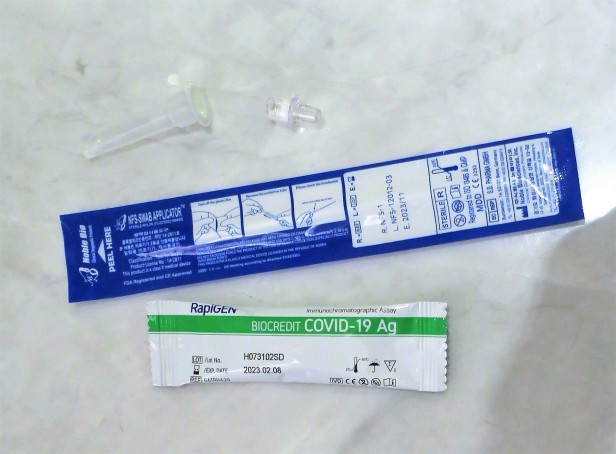The post on January 18 described the program the U.S. government is implementing to send four Covid-19 antigen rapid tests to each residence. Bravo! This action is welcomed but probably deserves to be filed under the category “Too Little, Too Late.”
In early 2020 when public health authorities realized that the SARS-CoV-2 virus was a major worldwide problem, testing (in combination with other measures) was identified as one of the most effective weapons in the anti-pandemic arsenal.
For reasons unknown, fast and accurate Covid tests have never been developed and deployed to good effect in the United States. The Republic of Korea (ROK or South Korea) is another story.
In spite of becoming the second most infected country after China by March 2020, the ROK has since achieved great success in protecting its people from Covid-19. The ROK Ministry of Health and Welfare published the chart below. It contains much information on the current status of the pandemic in South Korea and the world.

For purposes of this discussion, the chart’s most telling stats are that, as of January 20, 2022, South Korea has recorded only 6,480 Covid deaths total in the entire pandemic and is currently experiencing less than 5,000 daily new infections in the Omicron surge. South Korea has a population of just over 51 million people.
In comparison, statistics for my country, with a population of about 325 million, reveal that to date we have suffered more than 850,000 Covid deaths and 68 million infections. Current seven-day averages in the U.S. are about about 750,000 daily infections and 2,000 daily deaths. The situation is just as gloomy for many other prosperous countries.
Public Health Blocking and Tackling
There isn’t much mystery behind the ROK’s record in dealing with Covid. Much of the success in addressing the current pandemic was informed by lessons learned from the response to the outbreak of Middle East Respiratory Syndrome (MERS) in 2015. That outbreak taught the ROK the value of employing basic public-health tools and preparing for a pandemic before it strikes.
South Korea’s approach is explained in detail in an article by Shuren, Jeffrey and Stenzel, Timothy, “South Korea’s Implementation of a Covid-19 National Testing Strategy” Health Affairs, 25 May 2021. Instead of twiddling its thumbs and claiming the virus would eventually “just go away,” South Korea took action immediately.

It implemented a comprehensive, government-led core strategy comprised of three elements: testing, tracing, and treatment. The strategy:
- invested in commercial development of diagnostic tests for infectious diseases prior to the COVID-19 outbreak;
- reduced risk for manufacturers by guaranteeing the purchase of minimum quantities of tests and reimbursement once the tests were authorized;
- streamlined test evaluation by creating a capability in selected government laboratories to evaluate commercial manufacturer tests and studies during the process for obtaining emergency use authorization;
- developed a centrally coordinated, nationwide testing program that relied upon a limited number of authorized tests using non-proprietary systems commercially manufactured in high volumes; and last but not least
- established an automated system that collects and analyses personal data that reduced the time required for contact tracing from 24 hours to 10 minutes per case.

Testing and tracing has been an effective tool for South Korea to contain the COVID-19 outbreak because it has been combined with other important measures including a self-quarantine program, mask wearing, social distancing, selective, temporary business closures, and an effective communications strategy.
The U.S. Food and Drug Administration has studied South Korea’s response and published this report: “South Korea’s Response to COVID-19.” Curiously, the report omits any discussion of using the findings to improve the Covid-19 response in the U.S. and to my knowledge, there have been no recommendations to prepare for the next pandemic — colossal failures in my view.
Final Thoughts
In the west, we have been promised salvation through high-tech vaccines and expensive treatments. Vaccines are vey helpful in preventing deaths and serious illness once people are infected. I’m thankful we have them. However, vaccines should never have been viewed as the route out of the Covid-19 wilderness. A significant portion of the population refuses to be vaccinated and even vaccinated individuals can spread the virus and get sick.
Here in the U.S., we are approaching the Super Bowl – the annual championship game of American football, our most popular professional sport. The struggle with Covid is somewhat analogous to American football. Teams spend enormous amounts of time and energy drawing up elaborate offensive and defensive schemes and analyzing the schemes of opponents. In reality, all that fancy analysis and effort depends on the players’ ability to execute the fundamentals of the game – blocking and tackling.
Similarly, a country’s success in fighting the virus that causes Covid depends on its ability to follow well-known, comparatively inexpensive fundamentals of public health such as testing and contact tracing more than on untried high-tech solutions.
For you enjoyment (if you hadn’t heard the song enough) here’s PSY kicking it Gangnam style on YouTube music video. Oppa Gangnam Style!
What are your thoughts on the best way to get out of the pandemic? Thanks for visiting and taking the time to read.

Informative blog!
LikeLiked by 1 person
Thanks for visiting.
LikeLike
As things are in my country, I think we will all get Covid as well. These days people seem to care less and less about it and even the government is not being too strict with regulations and seems quite happy people are spreading the virus as long as the medical system doesn’t collapse. The only positive thing is that the virus is becoming weaker and hopefully the pandemic will be over in the near future.
LikeLiked by 1 person
Covid may burn itself out so to speak. Unfortunately, many more will die before that happens. Stay safe and enjoy the weekend.
LikeLiked by 1 person
three cheers for South Korea. I think a multi-pronged approach is best – masking, distancing, testing, and vaccinating…
LikeLiked by 1 person
Yes. No sense holding back. Use all options. Part of ROK’s success was the preparation before the virus. We should be planning and preparing for the next one now.
LikeLiked by 1 person
I agree; let’s hope we’ve learned some lessons from the current pandemic
LikeLiked by 1 person
Whatever lessons are learned need to be formally and thoroughly documented and maybe some legislation should be proposed.
LikeLiked by 1 person
good luck with any legislation…
LikeLiked by 1 person
Legislation could be tough. We’d so who supports public health and who doesn’t.
LikeLiked by 2 people
I think I already know…
LikeLiked by 1 person
It is kind of obvious isn’t it
LikeLiked by 2 people
🙂
LikeLike
I’m still trying to process how “2 weeks to slow the spread” turned into two years…
LikeLiked by 1 person
Ha ha! Spread just keeps on spreading. I hope you all in NYC are getting through winter okay.
LikeLike
It is amazing the message “If we all work together, we can get through this.” works better than, “It’s just a flu, get your medical info off the web, do not trust doctors and science, we don’t have to follow rules, just keep doing what you want.” Canada has had a similar approach to the latter and while our cases and deaths/capita are about a thirds of that in the U.S. the continued politicization/ misinformation/disobedience is hampering the whole process. Getting Covid or dying from Covid should not be the fear. Living with Long Covid should be. In time, we will all get Covid. Those with vaccinations will likely fare better than those without, but we will all get Covid. Hopefully, within a year, the mutations weaken it to the the status of it relative, the Common Cold. In the meantime, stay well, my friend. Allan
LikeLiked by 1 person
At the rate we are going in the west, it sure seems like we will all get Covid at some point. I’m not sure getting Covid is inevitable if we duplicated the ROK model. We’ve screwed this pandemic up pretty badly. Not being prepared for the next one would be downright shameful. I really appreciate your sharing your perspective, Allan. Take care! John
LikeLiked by 1 person
S. Korea followed a libertarian model of maximum testing
But it’s success in testing is very much engraved due to already established best practices in place:
1- The SE Asian countries had suffered from Swine flu, SARS, MERS etc.
2- The mask-up culture is very pronounced there.
P.S. : USA has done the largest no. of testings in the world. It has seen the largest number of deaths because of unknown epidemiological reasons. Also, USA’s insurance model for private healthcare is totally unsuitable for the pandemic
Cheers for the post!!!
LikeLiked by 1 person
Thanks much for your comment! Asian experience with those other pandemics was indeed very helpful in their response to Covid. Still that experience should have been well known to epidemiologists everywhere and used to formulate responses worldwide.
The US has performed the most tests but we don’t use the info to contact trace in a meaningful way. We’ll see if the experience with Covid teaches the rest of the world how to prepare for the next pandemic.
LikeLike
There’s a lot we can learn from how other countries have been handling the pandemic. The frustrating thing that we’re dealing with in Canada is that because most of the hospitalizations are unvaccinated people who have COVID, that means patients with other health issues are no longer being prioritized.
LikeLiked by 1 person
It is the same here. Many elective procedures are on hold and sometimes even emergencies have trouble finding ICU beds. We can also learn a lot from how countries have mishandled Covid. Thanks for taking time from your parks challenge to read and comment.
LikeLiked by 1 person
If there was a viable way to de-politicize Covid, the U.S. could follow a model similar to that of South Korea. Otherwise, the U.S. healthcare system will continue to be hindered.
LikeLiked by 1 person
It is a shame that the vast majority of politicians care about their elections more than the welfare of the country.
LikeLiked by 1 person
Great piece. Until recently I had a friend living in South Korea who was also impressed with how they handled the pandemic. Despite a generally anti-foreigner vibe running through the country (“foreigners are bad, foreigners bring COVID”), he eventually got his shots out there. Western and eastern philosophies on this are fascinating to compare, nicely done with the football comparison at the end.
LikeLiked by 1 person
Greetings Leighton! I read that the 14-day self-quarantine violation rate is less than 1% in the ROK. That’s amazing!
LikeLiked by 2 people
It’s very true–our country is not doing a very good job in responding to COVID. We could learn a lot from South Korea.
LikeLiked by 2 people
The numbers of infections and deaths certainly indicate that we could learn a lot. Thanks for stopping by and sharing your thoughts.
LikeLike